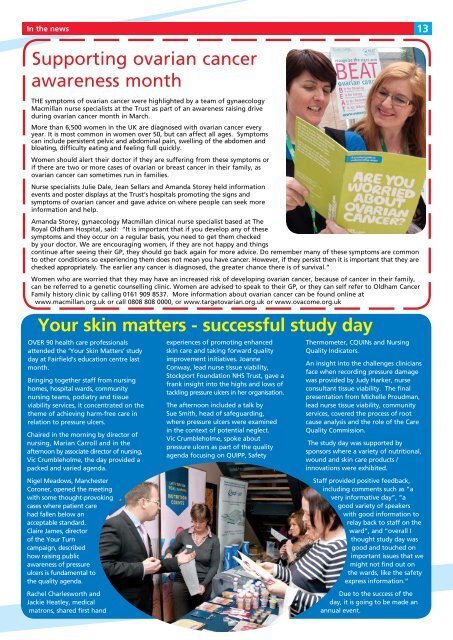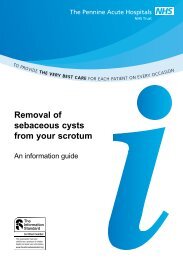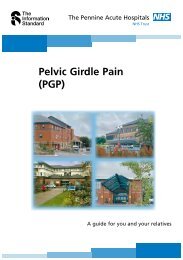May 2012 - Pennine Acute Hospitals NHS Trust
May 2012 - Pennine Acute Hospitals NHS Trust
May 2012 - Pennine Acute Hospitals NHS Trust
You also want an ePaper? Increase the reach of your titles
YUMPU automatically turns print PDFs into web optimized ePapers that Google loves.
In the news<br />
Supporting ovarian cancer<br />
awareness month<br />
THE symptoms of ovarian cancer were highlighted by a team of gynaecology<br />
Macmillan nurse specialists at the <strong>Trust</strong> as part of an awareness raising drive<br />
during ovarian cancer month in March .<br />
More than 6,500 women in the UK are diagnosed with ovarian cancer every<br />
year . It is most common in women over 50, but can affect all ages . Symptoms<br />
can include persistent pelvic and abdominal pain, swelling of the abdomen and<br />
bloating, difficulty eating and feeling full quickly .<br />
Women should alert their doctor if they are suffering from these symptoms or<br />
if there are two or more cases of ovarian or breast cancer in their family, as<br />
ovarian cancer can sometimes run in families .<br />
Nurse specialists Julie Dale, Jean Sellars and Amanda Storey held information<br />
events and poster displays at the <strong>Trust</strong>’s hospitals promoting the signs and<br />
symptoms of ovarian cancer and gave advice on where people can seek more<br />
information and help .<br />
Amanda Storey, gynaecology Macmillan clinical nurse specialist based at The<br />
Royal Oldham Hospital, said: “It is important that if you develop any of these<br />
symptoms and they occur on a regular basis, you need to get them checked<br />
by your doctor . We are encouraging women, if they are not happy and things<br />
continue after seeing their GP, they should go back again for more advice . Do remember many of these symptoms are common<br />
to other conditions so experiencing them does not mean you have cancer . However, if they persist then it is important that they are<br />
checked appropriately . The earlier any cancer is diagnosed, the greater chance there is of survival .”<br />
Women who are worried that they may have an increased risk of developing ovarian cancer, because of cancer in their family,<br />
can be referred to a genetic counselling clinic . Women are advised to speak to their GP, or they can self refer to Oldham Cancer<br />
Family history clinic by calling 0161 909 8537 . More information about ovarian cancer can be found online at<br />
www .macmillan .org .uk or call 0808 808 0000, or www .targetovarian .org .uk or www .ovacome .org .uk<br />
Your skin matters - successful study day<br />
OVER 90 health care professionals<br />
attended the ‘Your Skin Matters’ study<br />
day at Fairfield’s education centre last<br />
month .<br />
Bringing together staff from nursing<br />
homes, hospital wards, community<br />
nursing teams, podiatry and tissue<br />
viability services, it concentrated on the<br />
theme of achieving harm-free care in<br />
relation to pressure ulcers .<br />
Chaired in the morning by director of<br />
nursing, Marian Carroll and in the<br />
afternoon by associate director of nursing,<br />
Vic Crumbleholme, the day provided a<br />
packed and varied agenda .<br />
Nigel Meadows, Manchester<br />
Coroner, opened the meeting<br />
with some thought-provoking<br />
cases where patient care<br />
had fallen below an<br />
acceptable standard .<br />
Claire James, director<br />
of the Your Turn<br />
campaign, described<br />
how raising public<br />
awareness of pressure<br />
ulcers is fundamental to<br />
the quality agenda .<br />
Rachel Charlesworth and<br />
Jackie Heatley, medical<br />
matrons, shared first hand<br />
experiences of promoting enhanced<br />
skin care and taking forward quality<br />
improvement initiatives . Joanne<br />
Conway, lead nurse tissue viability,<br />
Stockport Foundation <strong>NHS</strong> <strong>Trust</strong>, gave a<br />
frank insight into the highs and lows of<br />
tackling pressure ulcers in her organisation .<br />
The afternoon included a talk by<br />
Sue Smith, head of safeguarding,<br />
where pressure ulcers were examined<br />
in the context of potential neglect .<br />
Vic Crumbleholme, spoke about<br />
pressure ulcers as part of the quality<br />
agenda focusing on QUIPP, Safety<br />
Thermometer, CQUINs and Nursing<br />
Quality Indicators .<br />
An insight into the challenges clinicians<br />
face when recording pressure damage<br />
was provided by Judy Harker, nurse<br />
consultant tissue viability . The final<br />
presentation from Michelle Proudman,<br />
lead nurse tissue viability, community<br />
services, covered the process of root<br />
cause analysis and the role of the Care<br />
Quality Commission .<br />
13<br />
The study day was supported by<br />
sponsors where a variety of nutritional,<br />
wound and skin care products /<br />
innovations were exhibited .<br />
Staff provided positive feedback,<br />
including comments such as “a<br />
very informative day”, “a<br />
good variety of speakers title with good information to<br />
relay<br />
“If you<br />
back<br />
suand<br />
to staff<br />
The<br />
on<br />
Christie<br />
the<br />
ward”,<br />
saved my<br />
and<br />
life<br />
“overall<br />
and I can’t<br />
I<br />
thought<br />
thank them<br />
study<br />
enough<br />
day was<br />
.”<br />
good and touched on<br />
important Photo courtesy issues of that MEN we .<br />
might not find out on<br />
the wards, like the safety<br />
express information .”<br />
Due to the success of the<br />
day, it is going to be made an<br />
annual event .







